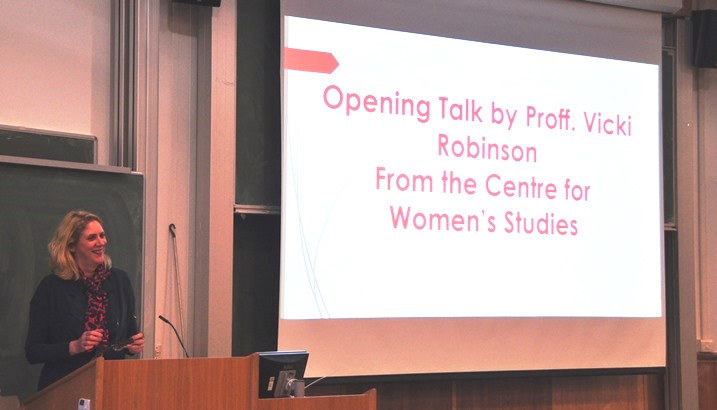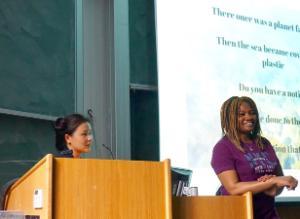Teamwork Pays: Film Screening Project
Posted on 10 May 2017

On 25 April and 2 May 2017 respectively, we screened two thought-provoking documentaries - The True Cost and Plastic China. Our aim was to explore the capitalistic tendencies of fast fashion and create awareness of the human factor in promoting environmental sustainability and human rights.
We received a wide range of support from a variety of sources to make our project a success. More specifically, we won the Postgraduate community fund offered by the Graduate Students Association (GSA) which catered for the running cost of the project.
Although challenging, it was really exhilarating for us to work together on a project that meant stepping out of our comfort zones to engage in a different but relevant project. Scouting for appropriate venue, designing flyers and posters, negotiating with film directors, deliberating with GSA, buying food and drinks, and carrying out intensive publicity were among the many activities we engaged in to organise the film screening. Team work sure pays - showing mutual understanding for each other, respecting each other’s time and harnessing each other’s strength all played to our favour (two good heads are indeed better than one).

We estimated to have about 50 people for each screening; however, for the first screening, “The True Cost”, we had over 80 people while we counted about 100 for the second screening, “Plastic China”. We were honoured to have our very own CWS Director, Professor Victoria Robinson for the first screening, to deliver the opening address, speaking on “Fashion and Identity”. Professor Stevi Jackson, Dr Clare Bielby, Dr Evangeline Tsao and Dr Ting-Fang Chin among many others were also there to grace the occasion.
The 90-minutes film, The True Cost, is described as a ground-breaking documentary, which literally questions the true cost of our clothing. Unlike main stream media, the documentary shifts focus from the product to the process, laying emphasis not on the European slim models parading the aisles but on the third world poverty-stricken workers (mostly women), who use not just their sweat but almost their blood to produce these clothes. It exposes exploited workers who carry out arduous tasks in unsafe environment, which results in some becoming victims of factory fire and collapsed buildings. The film was quite emotional for the audience as some fought back their tears while others allowed them to flow freely. We had a session of reflective discussion right after the film on how/how not to question the true cost of whatever we consume.
The second documentary opened with a very short poem from Paula St Aves. Paula works for the Real People Theatre and her poem was on the environmental impact of our consumption of plastic. The poem ties in neatly with the theme of the film.
Although less intensive compared to the first, Plastic China is a documentary full of metaphorical intrigues. The title itself, “Plastic China”, is likened to the fragility of plastic surgery which symbolises a false global image of wealthy and prosperous China. Focusing on a household recycling shop, the film explores how plastic waste from developed countries is exported to China and recycled by poor workers using their bare hands. This act exposes the workers and their families to diseases, pollution and even death. A prominent character in the film, is 11year old Yi-Jie, who symbolises the global child, whose life is confined to and constructed by the way of life and belief system of her parents. Her desire to be educated is ignored, while she is groomed to understand the world only from the wastes of the family business. Again, the film expresses the need to critically examine the impact of global consumerism.
Thankfully, at the end of the film, the director of the film, Jui-Ling Wang, was available via skype to answer questions from the audience. There were many thought-provoking questions and contributions from the audience. A number of students stayed back to have a brief discussion with us on “the way forward”. Interestingly, this project has just birthed another project, which is a product of our brief discussion—watch out for “Real Rubbish Diary”, a reflective documentary put together by a team of post graduate students.
